- Home
- Kate Danley
Olde Robin Hood
Olde Robin Hood Read online
Olde
Robin Hood
by
Kate Danley
Table of Contents
Title Page
DEDICATION
This is probably not your Robin Hood
CHAPTER ONE
CHAPTER TWO
CHAPTER THREE
CHAPTER FOUR
CHAPTER FIVE
CHAPTER SIX
CHAPTER SEVEN
CHAPTER EIGHT
CHAPTER NINE
CHAPTER TEN
CHAPTER ELEVEN
CHAPTER TWELVE
CHAPTER THIRTEEN
CHAPTER FOURTEEN
CHAPTER FIFTEEN
CHAPTER SIXTEEN
CHAPTER SEVENTEEN
CHAPTER EIGHTEEN
CHAPTER NINETEEN
CHAPTER TWENTY
CHAPTER TWENTY-ONE
CHAPTER TWENTY-TWO
CHAPTER TWENTY-THREE
CHAPTER TWENTY-FOUR
CHAPTER TWENTY-FIVE
CHAPTER TWENTY-SIX
CHAPTER TWENTY-SEVEN
CHAPTER TWENTY-EIGHT
CHAPTER TWENTY-NINE
CHAPTER THIRTY
CHAPTER THIRTY-ONE
CHAPTER THIRTY-TWO
CHAPTER THIRTY-THREE
CHAPTER THIRTY-FOUR
Did you like what you read?
Other Books by Kate Danley
Acknowledgments
About the Author
Legal Stuff
DEDICATION
To the ancient bards, balladeers, wandering minstrels, and storytellers
who kept Robin Hood alive.
And to those who live in ways inspired by his spirit today.
This is probably not your Robin Hood
The Robin Hood most people know, with King Richard and Prince John, was actually a fiction popularized by a contemporary of Shakespeare's named Anthony Munday. His plays about Robin Hood were as popular as Old Will's stuff. Munday's plays went on to spawn tales by Alexandre Dumas, Sir Walter Scott, and just about every movie you've ever seen about Sherwood's favorite son.
But there are older stories about the real Robin Hood. And his tales were passed down verbally through ballads spoken around the fire in taverns and pubs dating back to the 1200s. You'll find Robin's name on the ancient rolls of court cases and prison sentences starting in 1225, during the reign of King Henry III. This is the Robin Hood you will discover on the pages that follow.
This book was written to honor the history of a poor man who was not noble born. And to honor those who kept him alive in the only way they could: by speaking his story.
CHAPTER ONE
The castle burned. Flames licked the sky. The soot roiled like angry storm clouds. The cries of men and women drifted across the field, begging for mercy or a swift death.
Neither would be theirs.
"Such a shame they could not get out in time," said a man. He sat on a tall, dark horse. He flicked back his cloak, revealing an embroidered coat of arms on a black tabard. The sight was so terrifying, it caused a serf to cower and scamper away. Philip Marc, the High Sheriff of Nottinghamshire, Derbyshire and the Royal Forests, smiled benevolently, allowing him to escape. Survivors would spread the truth of what happened to those who resisted him. "They should not have hesitated when asked to swear allegiance." He turned to the gentleman seated on the horse beside him. "Sir Guy, you are sure the locks shall hold?"
"I set them myself, Sheriff," Guy of Gisborne replied, bowing.
"You shall be rewarded handsomely for your loyalty." The Sheriff tilted his head back to behold the spectacle better, freeing a shock of blonde hair from the corner of his chainmail hood. "Those who will not join us are against us, and we must rip the insurgence from the roots before it becomes a pernicious weed that chokes the good and faithful citizens of our land."
Guy placed his fist upon his heart, taking the Sheriff's pronouncement as a command.
The Sheriff of Nottingham's face contorted from contentment to contempt. "I told them all they needed to do was pay one-hundred pounds to enjoy the king's peace. I warned them. But they refused. This is all their doing." Philip Marc's face twitched and twisted with some unspoken inner argument. His eyes flashed. But slowly, he won his internal struggle. Everything calmed. He sat, quiet once more. Then he yawned. Then scratched his elbow. He heaved a sigh as the tower continued to blaze and the screams did not abate. Bored, he turned his horse away. "I am to bed. Ensure this burns until morning and there are no survivors. Just as we promised."
And with those words, he struck his heels into the side of his mount and left.
Sir Guy of Gisborne regarded the retreating form of the Sheriff Philip Marc. He thought to himself how wise and strong a leader he now followed, a man who understood human nature and would bring their land back from the brink of ruin, a man who would finally quell the peasants' unrest and remind them they were but one step above the worms. Some minstrels had been filling their ears and minds with nonsense, Guy reflected, but the Sheriff of Nottingham would remind them the royal family answered only to the heavens. The barons and their mindless followers may have descended into chaos rebelling against King John, may have even written Philip Marc's removal into the Magna Carta, but they should grovel at the feet of those who loyally served King Henry III.
He lifted his midnight eyes towards the castle and settled in his saddle for the long, cold hours ahead. The flames struck the wooden rooftop and it collapsed like wisps of tinder.
Guy smiled.
CHAPTER TWO
The point of the plowshare struck a root. The oak handles slipped out of Robin's callused grip.
The nag stopped and looked at him as if to say, "Is it not time to call it a day?"
Robin wiped his brow with the back of his sleeve, the coarse tunic scraping his dusty skin. His black curls matted to his forehead. He caught his breath and then, with a mixture of love and resentment, dug the wooden shoe back into the earth.
His father was an honest yeoman, a freeman, owner of his own farm. But as the plow hit a rock, jarring Robin's arms in their sockets again, he could not help but think how much better it would have been to have been born a knight or a lord. At this point, he was ready to run away and take holy orders. At least at the end of a barley harvest, the monks had a cellar full of ale.
Though only May, the day was as warm as deep summer. He glanced over at his friend, Much. Much's father needed the family ass for work at the mill, so Much hitched his crude plow to himself and pulled it behind. A sheen of sweat covered his moon-shaped face.
The two men had known each other since childhood. Neither had traveled far beyond their humble village in Barnsdale. For a share of the harvest, Much helped in the field, as much as the workload at his father's mill allowed. But more and more, there was less and less wheat to grind and, more and more, less food from the small Hood farm.
"Robin! Much!" A worn voice wavered across the field. "Your supper will be getting cold!"
"Coming, father!" Robin shouted back.
Much gave Robin a relieved smile and put down his plow. He trotted off towards the mud and thatch house, grateful to be done.
Robin jammed his plow into the furrow and unhitched the mare.
There was a peace.
He was exhausted, sore, bone weary... but as he gazed up at the softening skies, there was a quiet.
He knew of no other way to find the stillness between work's end and the start of the evening aside from a backbreaking day.
His father welcomed Much, motioning him through the low doorframe and then shuffling in behind.
A pang struck Robin in the pit of his stomach and the peace was gone.
His father was already forty-three years old, far too old t
o sustain the work needed to keep the farm thriving. Illness struck in February, and his stooped gait spoke of the unwelcome, lingering weakness.
Robin led the horse to a gentle brook beside the animal's pen. He would bring the nag inside the house for the night, but it was safe enough during the day to allow her to graze and roll in the dust. Besides, sunlight allowed any thief to get a good gander at the beast and Robin was sure that would deter anyone more than a fear of the law.
Robin patted the horse's withers as she drank her fill. "Good girl."
"ROBIN!" his father called again.
His fragile voice caused the fear in Robin's stomach to uncurl like a snake and slither through his chest. The farm was too much for just one man, even with help. And here he was, already eighteen, without a wife, much less a son, to join him in the fields. Would his father's line die out with him? Would Adam Hood's farm and all they had worked for be lost to a landlord? Would no one but a miller's son named Much remember the family Hood?
Robin leaned against the crude fencing. He crossed his arms and gazed at the other buildings dotting their village: Much's mill; the recently completed chapel dedicated to Saint Mary; the slate-roofed, open-air market pavilion; and the small homes that were as familiar to him as his own.
Everything was still.
Everyone had gone in for their evening meal.
It was safe.
Robin pulled a single silver coin from a pouch tied to his belt.
The penny was warm in the palm of his hand. He had discovered it in the road, no doubt lost by a traveling merchant so rich, he did not even notice it was gone.
But this precious, round disk could make everything better.
Robin held it tight, squeezing a prayer of protection and goodwill into the metal, before reverently putting it back.
He walked the horse to its pen. His father had already filled the manger with the animal's supper. Robin cursed, wondering what the exertion would cost his father's health.
He had to make things better.
Robin paused to pick up firewood from their meager pile. Even the sparse stack seemed an accusation of his failure. By royal decree, they were not allowed to take much from the forest, they had to buy it from a woodcutter. Perhaps if he secretly brought more in, his father wouldn't feel the compulsion to steal out to the trees to gather more or try to split the logs on his own. Adam could only make it through two or three pieces before he needed to rest.
The unwanted image of finding his father lying in the field, clutching his left arm, flashed in Robin's mind.
The cold, hollow memory of wondering if his father was dead.
The desperation as he clasped his father to his chest, calling for help.
The days of bleedings and tonics and prayers and holy relics, the midwives and doctors and priests. The sickly grey tinge that came to his father's skin, the hacking cough that never lessened, and the weakness that refused to leave. The debts Robin piled up, their entire flock of sheep he sold to pay anyone who could save his father's life. The fruitless diagnoses of unbalanced humors, leaks between his heart and lungs, past sins, and the devil.
Robin swatted away a blood-hungry horsefly.
He stepped inside.
The fire in the center of the dirt-floored room crackled low. A pang of guilt was added to the worry. Robin had been so busy in the fields, he had not been out to hunt, and his father had made do with what he could find with forest greens and mushrooms. Much was seated beside the embers, so excited for his bowl of thin soup. Robin's father set another on a stool for Robin.
Adam did not pour a bowl for himself.
Robin's stomach gnawed with hunger.
They had played this game before.
His father was frightened his son did not have enough to eat.
Robin was frightened if he ate all his share, his father would die.
Robin placed the wood down by the wall.
"I'll bring in the horse before dark," said Robin, watching jealously as Much attacked his food. "I'm going to find some pigeons or rabbits before sunset."
Adam eyed him with knowing suspicion. He nudged the soup Robin's direction. "The light will be gone soon. Have some supper."
"I'll be back before sundown," Robin replied, grabbing his bow and arrow and dashing towards the door.
"But your supper!" his father cried after him. He could not continue the sentence. He began hacking like his lungs wanted to expel themselves from his chest.
Robin called back as he stepped outside. "Finish it so it doesn't go to waste!"
"Goodbye, Robin!" Much shouted cheerily.
Robin strode across the tall grass towards the tree line of the forest. He did not pause for his father's reply. The rasping cough followed him into the woods.
But at least the edge of his worry softened, knowing his father's stomach would be filled. When Robin went out for the hunt, there was no need to stretch their soup in fear of hungry days. They would eat well.
Robin fitted the string to his bow.
He would make sure they ate well.
He had to.
CHAPTER THREE
Robin woke to the mare blowing hot air in his face. He pushed the horse's head aside as he peeled his crusty eyes open. It was early. Barely light. The rooster had not even crowed. But suddenly he remembered what day it was, and he leaped out of bed.
He tried to move around the cottage without waking his father, whose breath came in rattling wheezes. Any sleep was a gift.
The horse followed him, bumping his shoulder softly for her morning meal. He led her to the stream where he could scrub his face and armpits while she drank. He filled her manger and left her to graze in her pen, giving her a parting pat. "Watch out for father while I'm gone."
He changed into his best tunic outdoors, trying not to create any noise, but by the time he returned, his father had risen and he was puttering around the room.
Robin tried to hide his excitement as he gathered his things. "I shall be back before sundown."
Adam smiled, noting Robin's fresh face. "May Games?"
Robin nodded, trying not to give away all of his hopes and dreams for the day. It would be too much weight to carry if he were to shoulder his father's expectations on top of everything else.
Adam motioned to Robin's bow, his voice full of guessing. "Do you have plans to enter the archery tournament?"
"No," said Robin, too quickly. He tried to recover, his fingers fumbling as he crossed the quiver's strap across his chest. "Safety on the road... and such..."
"Well, you should take your knife, too," Adam said with a wink, taking the blade off the table and handing it to Robin. "For better safety."
Robin looped it on his belt. "May I bring you anything? Will you be all right here on your own?"
Adam dismissed his concerns. "I shall enjoy a quiet day of rest, perhaps gather some food from the forest to celebrate your adventures when you return. Much will be by for supper and conversation. No need to hurry home! I require only stories of your wonderful day."
"I will bring them to you, father," he said, distracted. He stood at the door, hoping he had not forgotten anything.
Adam shuffled over and rested his hands on Robin proudly, then placed a kiss atop Robin's black curls and sent him off. "Good luck! Have great fun!"
"I shall," said Robin, feeling vaguely guilty. He managed a small, weak smile, the unspoken secret caught behind his lips. He nodded and then ducked out of the short door towards the dirt road.
His father followed and waved until Robin disappeared from sight. "Remember everything for me!"
As soon as Robin crested the hill and headed down into the hollow, he paused. He checked the small pouch at his waist to make sure the precious penny had not fallen out somewhere between the house and road.
It was still there.
A quiet voice within warned him it was wasteful spending it on such a gamble. But the opportunity? He glanced back towards the land he and his father worked
so hard to coax a bounty from every season, an earth which was becoming harsher and stingier in her returns. If he won, it would mean an end to all their debts.
He patted the coin in the drawstring bag.
It was worth the chance.
And he continued on his way.
As he neared the festival grounds, the travelers on the road thickened. Happy voices filled the air as the excitement built.
"Off to the games, too?" asked a man as Robin passed.
"See you there!" Robin replied, adding speed to his steps.
"Fine, strong bow! Is that made of yew?" teased a buxom girl as Robin jogged past.
Robin tucked his chin down and kept running.
"I'll be watching for you in the tournament, young archer!" called an elderly gentleman tottering along with a cane. He took off his hat and spun it overhead as if to speed Robin along.
A rosy-cheeked child skipped and danced, asking her parents if they were almost there. In the distance, there were roars from the competitions, cheers and groans.
The road bent.
And Robin turned the corner.
Revealed, stretched out as far as he could see, were the May Games.
Snapping pennants and bright tents littered the grassy field. Pipes and drums mixed with the voices of the revelers. Merry vendors called out, inviting Robin to taste their wares. The colors and scents and sounds swirled into happiness.
He played with the coin. All this could be his. He could spend his penny and have such memories, memories of delights that would last his lifetime. He could rest on his deathbed and think of the one May Games day when the world was his.
But with great will, he steeled his focus. He narrowed his sight and blocked out all temptation. It could all be his if he won. He told himself it would all be his if he won. But first, he was here for one reason and one reason only. He squared his shoulders and walked towards the far end of the field.
As he neared the gathered men, he reminded himself that he had cured his own yew bows made from the Barnsdale trees since he was a beardless lad. He fletched his own arrows. His equipment was strong and true. Any fault would lie only in his skill, and he had stolen out to the woods to train every day since he found the penny.

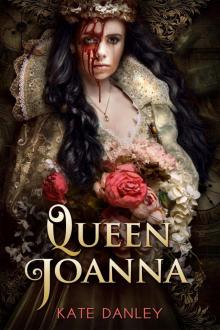 Queen Joanna
Queen Joanna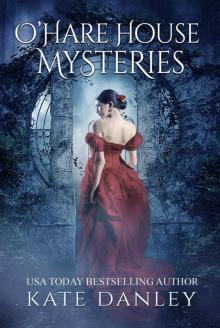 O'Hare House Mysteries
O'Hare House Mysteries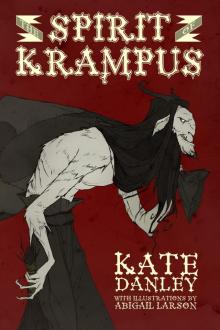 The Spirit of Krampus--Illustrated
The Spirit of Krampus--Illustrated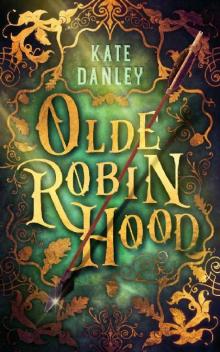 Olde Robin Hood
Olde Robin Hood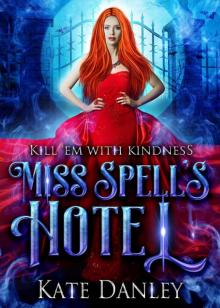 Miss Spell's Hotel
Miss Spell's Hotel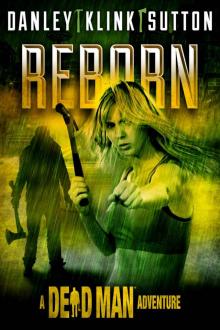 Reborn
Reborn